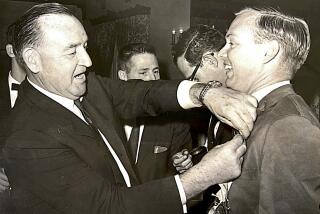PASSINGS
Wiles Hallock
He oversaw expansion of the Pac-8
Wiles Hallock, 91, the former Pacific-10 Conference commissioner who oversaw the league’s expansion from eight to 10 schools, died Monday at his home in Walnut Creek, Calif.
The Pac-10 announced Hallock’s death in a news release. No cause of death was given.
Hallock was commissioner of the conference from 1971 to 1983. Before joining the then-Pac-8 Conference, Hallock was commissioner of the Western Athletic Conference. He also held various positions with the NCAA.
Hallock oversaw the expansion of the Pac-8 to the Pac-10 in 1978 when the University of Arizona and Arizona State University moved over from the WAC.
Claude Wiles Hallock Jr. was born Feb. 17, 1918, in Denver and received a bachelor’s degree from the University of Denver in 1939. He ran track in college and served as track coach at the University of Wyoming for five years.
Paul Hemphill
Writer’s focus was the Deep South
Paul Hemphill, 73, a journalist and novelist who wrote about sports, country music and the haunted legacy of the South, died Saturday of oral cancer at a hospice in Atlanta.
In the 1960s, before he turned to writing books, Hemphill was a much admired newspaper columnist in Atlanta and was sometimes called the Jimmy Breslin of the South. He left newspapers behind in 1970 when he wrote a best-selling book about country music, “The Nashville Sound: Bright Lights and Country Music,” but he never quite recaptured his early success.
The son of a long-distance trucker, Hemphill grew up in Birmingham, Ala. He graduated from Auburn University in Alabama and worked as a newspaper reporter in Alabama, Georgia and Florida before moving to Atlanta in 1964. He wrote a column six days a week for the Atlanta Journal. He later worked briefly for the San Francisco Examiner.
He burned many of the bridges to his hometown with his 1993 memoir, “Leaving Birmingham,” which exposed his father’s racist leanings and showed little mercy for the city’s pieties. But in novels, memoirs and journalism, he kept returning to the world of the blue-collar South, showing a great knack for capturing its speech, sorrows and pathos.
“Most of my best writing is ultimately sad,” he wrote in the introduction to a 1981 collection of journalism, “Too Old to Cry.” “It is about lost dreams and excess baggage and divorce, whiskey, suicide, killing, and general unhappiness.”
Among his other works are “The Heart of the Game: The Education of a Minor League Ballplayer,” a 1996 book reviewing a single baseball season; “The Ballad of Little River,” a 2000 nonfiction account of aimless, disillusioned white youths from Alabama who went to prison for setting fire to a black church; and “Lovesick Blues,” a well-received 2005 biography of a fellow Alabaman, singer-songwriter Hank Williams.
Amin al-Hafez
Former politician in Lebanon
Amin al-Hafez, 83, former Lebanese prime minister who served a turbulent two-month term in 1973 before being forced to resign, died Monday in a Beirut hospital after a long-running battle with an undisclosed chronic illness, medical officials said.
A Sunni Muslim, he was picked by then-President Suleiman Franjieh to form a government in 1973. Although the prime minister’s job is reserved for a Sunni under Lebanon’s sectarian power-sharing system, Sunni religious leaders who opposed Franjieh refused to recognize the appointment. Al-Hafez was forced to resign about two months later.
The crisis, along with a battle between Lebanese troops and Palestinian guerrillas that year, contributed to the tensions that burst into all-out civil war in 1975. The sectarian conflict lasted 15 years.
Al-Hafez later served as a member of parliament, representing his hometown of Tripoli until 1996.
-- times staff and wire reports news.obits@latimes.com
More to Read
Start your day right
Sign up for Essential California for the L.A. Times biggest news, features and recommendations in your inbox six days a week.
You may occasionally receive promotional content from the Los Angeles Times.






